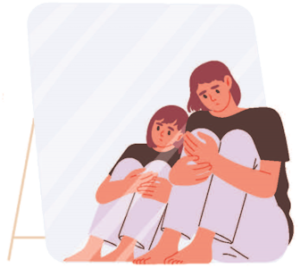Becoming Comfortable in Your Own Skin
Do you remember tripping in front of the cool kids at school? Feeling wickedly embarrassed after stumbling through your lines? Feeling your skin tingle as the spotlight of attention fell on you at exactly the wrong moment? I know I do.
 For many adults with ADHD, the sense of being socially awkward has been a part of their daily experience since, well, forever. That’s my story, too. When you’re the socially awkward kid, it stays with you for a very long time. For us as adults, most upcoming social events, whether you’re truly in the spotlight or not, are met with resistance and dread. The voice in your head about everything that could go wrong, mixed with your lack of self-confidence, makes anticipating what’s to come feel like watching a train wreck in slow motion.
For many adults with ADHD, the sense of being socially awkward has been a part of their daily experience since, well, forever. That’s my story, too. When you’re the socially awkward kid, it stays with you for a very long time. For us as adults, most upcoming social events, whether you’re truly in the spotlight or not, are met with resistance and dread. The voice in your head about everything that could go wrong, mixed with your lack of self-confidence, makes anticipating what’s to come feel like watching a train wreck in slow motion.
But here’s what I want to tell you. If you’re like me and have the life experiences to back up being the awkward kid, you’re never really going to feel comfortable. Not instantaneously for sure. Why? Because feeling confident and comfortable in your own skin means feeling confident about what’s to come. And that is easier said than done.
Part of the truth here is that being neurodivergent can mean that you’re never really at ease with yourself. But that doesn’t mean it’s not worth trying to get there. Finding your way through the maze of self-confidence is how you shift your life to one that’s less stressful and easier on your mind and heart.
Today I use various practices to reduce the pressure to “get it right” and instead focus on being my best self, flaws and all. Here are five ways to go from feeling social awkward to more comfortable in your own skin.
Create emotional safety.
Being comfortable with yourself happens faster when you feel psychologically safe. This means the people around you are not threatening to you, and if you feel unsure of yourself, you have a go-to group of people in your life. When you don’t feel psychologically safe, your body and mind are on high alert. That makes it hard to try new things, reframe missteps, or even be in the moment. This is especially true in social settings where your awkwardness can be read and seen by the people around you. Create your own personal bubble of trusted confidants who celebrate you and your wins. That will reinforce the steps you’re taking and keep you working on your goals.
Pay attention to the story you tell yourself about who you are.
How you think about yourself matters. Often people with ADHD of all ages have an inner narrative about who they are based on the past. You may think of yourself as “too much” or a “bad friend” or “not good socially.” And while you may have had moments with these issues, it isn’t who you are. Learning to be comfortable in your own skin requires that you take stock of the stories you believe to be true and remember that you can change the story moving forward.
Listen and adjust your self-talk.
Negative self-talk can bombard and encase you in a hurtful prison of your own making. To feel comfortable in your own skin, you have to change your internal soundtrack. Listen when you are self-critical or say things like “you’re wrong” or “no one wants you/likes you/needs you.” Replace these negative messages with more positive messages like “I’m practicing something new, getting it right takes time” or “I’ll try again tomorrow.” When you find yourself worried or holding on to negative thoughts, take a deep breath and ask yourself, “What evidence do I have that this is true?” or “What else could it be?” Then write a new story, one with a more compassionate, realistic, and neutral tone. Instead of thinking, “They didn’t return my text because I was too outspoken” replace it with the possibility that “They might be busy because it’s a hectic time.”
Reframe your missteps.
Work toward putting your past experiences in context, such that they stop being larger than life and become more realistic. You’re allowed to make mistakes. As painful as your past may be, it is the past, and you can work on being the person you want to be right now. When you make mistakes or say things you wish you could take back, that’s the time when your inner critic comes out the loudest. But it’s an event and it doesn’t define who you are. You’ll never feel comfortable in your own skin if you think of yourself as “good” or “bad” or “always” or “never.” Instead, with self-compassion, try to let some of the pressure off. Remember that what happened was an event, not a statement about your character. Reframing your missteps goes a long way to quiet your inner critic and change the story loop playing in your head.
Embrace your strengths.
Take a good look at your strengths and leverage what you’re good at as a way to start cultivating self-love and appreciation. Embracing your strengths goes a long way to help build yourself up, and self- compassion helps you remember that every misstep is not a statement about your character. Your past is just one aspect of who you are. Do something that reminds you of your strengths every day. This is the real key to starting to build the mental muscle that will give you the courage to try new things and take risks in your life.
AS YOU EXPLORE BECOMING MORE CONFIDENT in yourself, the past story will start to fall away. It’s not instant, but with practice and determination, you will start to see more of the good in yourself and your story will change. That’s the beauty of the present, it is a gift that you can use to change your outcomes. And if your story is like mine, that is what’s needed to create the future you truly desire.


 Caroline Maguire, MEd, ACCG, PCC, earned a master’s degree at Lesley University with a specialization in social emotional learning (SEL). She is the author of Why Will No One Play with Me, an award-winning book designed to coach emotional regulation, social and self-awareness, and responsible decision-making skills. She founded the Fundamentals of ADHD Coaching for Families training program at the ADD Coach Academy, which is accredited by ICF.Visit her website,
Caroline Maguire, MEd, ACCG, PCC, earned a master’s degree at Lesley University with a specialization in social emotional learning (SEL). She is the author of Why Will No One Play with Me, an award-winning book designed to coach emotional regulation, social and self-awareness, and responsible decision-making skills. She founded the Fundamentals of ADHD Coaching for Families training program at the ADD Coach Academy, which is accredited by ICF.Visit her website, 